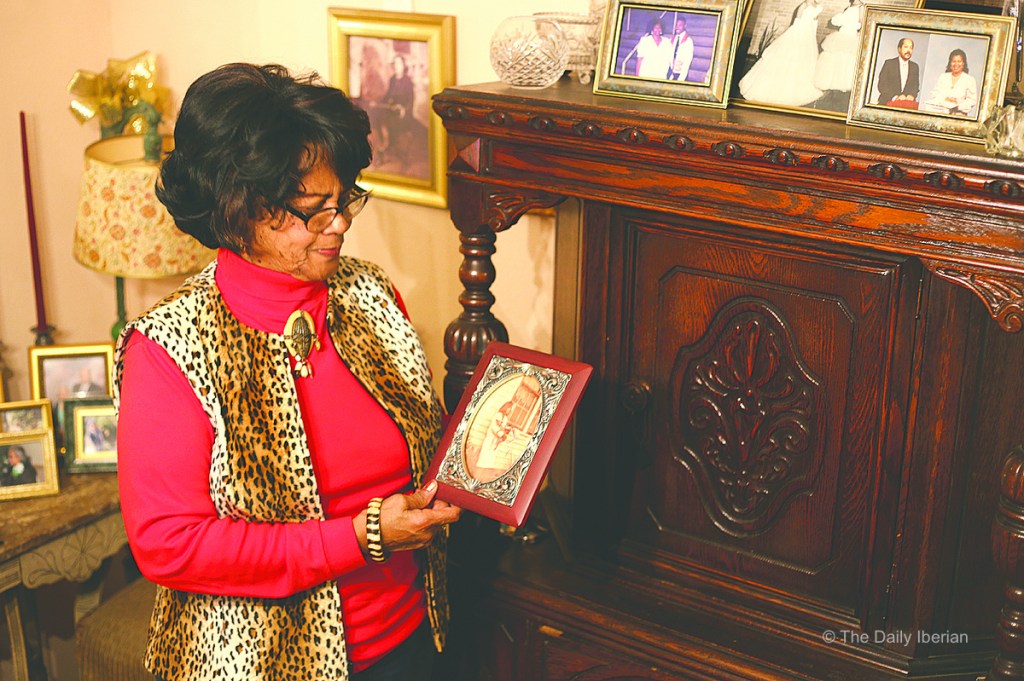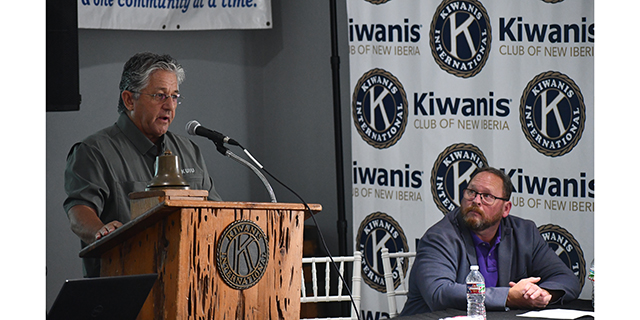Egland has had lengthy love affair with Haiti
Published 5:00 am Sunday, January 28, 2018

- Sandra Egland looks at a sepia-toned photograph of her mother. Egland lived in Atlanta in the 1960s and ran in the same circles as Dr. Martin Luther King Jr. and Stokely Carmichael. She took an active role in the Civil Rights movement then and works to preserve the black history of New Iberia now.
Haiti has been on the mind of Sandra Egland, a semi-retired polymath (a person whose expertise spans a high number of different subjects) in the West End, lately.
Years ago, Egland played a primary role in getting a historical marker for Félicité, the Haitian slave who nursed the stricken and ministered to the dying New Iberians during the yellow-fever epidemic of 1839. Born in Santo Domingo and known only mononymously as Félicité, the woman “closed the eyes of the dead, and wept over their graves,” the plaque, in front of the Civic Center, reads. She had an apparent immunity to the disease.
“She saved the lives of many people whose descendants are now living in New Iberia,” Egland said. “New Iberia should have a love affair with Haiti.”
The history of Haitian ties to the town of New Iberia — and to the state of Louisiana and the nation as a whole — is just one of the many interests occupying Egland’s time now. She is also a jeweler, a painter and collagist, a poet and a hobbyist historian.
The interest in Haiti began, in part, at a ceremony honoring New Iberia’s 146th anniversary, in 1985. She and her mother, Ruby, attended, where Glenn Conrad — then the director of the Center for Louisiana Studies at UL Lafayette and the New Iberia town historian — spoke about the city’s history.
“Professor Conrad gave an overview of the history of New Iberia, and he didn’t mention any black people — the people who built the roads, the people who served, the people who were slaves,” Egland said.
When Conrad finished his lecture, Egland raised her hand.
“I said that he had left out a significant group of people — the Africans,” she said. “Well, he ran toward me and his face turned ten shades of red.”
Conrad told her she was absolutely right. The two then began a long and productive friendship, which lasted until Conrad’s death, in 2003.
Ask around at the Iberia Parish Library or at Books Along the Teche for a history of New Iberia, and you will likely be pointed to the essay collection Conrad compiled on the town, “New Iberia: Essays on the Town and its People.” For it, he asked Egland to write an essay on black history in the Parish.
Egland’s chapter in the book offers brief overviews of the religious and cultural life and history of blacks in the area, and on the history of black schooling here. Egland’s mother was the first black principal.
Her grandfather, Louis Robertson, ran an informal, free school for blacks on the outskirts of town, in Morbihan.
“Sandra Egland is one of the first people I am aware of who attempted to document the history of Blacks in Iberia Parish,” said Phebe Hayes, a retired UL professor currently at work on a book about the history of black doctors in Iberia Parish. Hayes was recently profiled in these pages.
“I honor Sandra,” she said. “Everyone ought to recognize her contributions to the telling of our stories.”
In 1989 Egland joined the committee planning the town’s upcoming sesquicentennial.
She put together a Haitian art exhibit for the event at city hall, and she spoke about Félicité and the memorial plaque. Noncent Guiteau, the mayor of Aquin, Haiti, came to town to tour Cajun country and to attend a twinning ceremony. Aquin and New Iberia are sister cities still. Several of the members of Egland’s Methodist church have missions in Haiti, traveling there regularly. Homer Stelly, the Delcambre street commissioner who served in Haiti in the National Guard, found an Abbeville native living on the island nation there, heading a church.
“Haiti, the people who fought with us in the American Revolution!” said Egland.
In Savannah, Georgia, there is a monument to the Haitian soldiers recruited by the French to fight the British in the war that founded this country.
“Haiti, the people who freed themselves — the great Toussaint!” she said.
Toussaint L’Overture led the Haitian rebellion that overthrew the colonial government and emancipated the Haitian people.
“Haiti, the people who have endured so much and still persevere,” she said.
Egland’s mother, Ruby, was the first black woman to vote in New Iberia, England said — and she’s got the documents and a letter from the former registrar of voters to prove it. England herself said she’s been an activist since the age of 16, when she recalls helping a lawyer from Detroit, Michigan, register black people in Morbihan to vote.
“I still carry voter registration cards in my car, because it’s so important,” she said.
After graduating from Henderson High School, Egland studied at Dillard University, in New Orleans, and then Ogalthorpe University, near Atlanta, where she stayed for many years, working “in the movement,” she said.
“It was a good time to be in Atlanta,” she said. “I had dinner at Martin Luther King’s house.”
Also at that dinner was Stokely Carmichael, Kathleen Cleaver, and a young Jesse Jackson.
“He was a real country preacher then,” she said of Jackson. “His hair was cut so short he was almost bald, and he wore a skinny tie.”
Over several decades in Atlanta and in San Francisco, Egland worked with the Student Nonviolent Coordinating Committee and the Congress on Racial Equality.
“I didn’t stand by and watch history, I participated in history,” she said.
When she moved back to New Iberia to be with her aging mother, she worked with the local NAACP, eventually serving as its president for a brief time.
It was then that she began digging into the history of Haiti and of black life in New Iberia.
Her chapter in Conrad’s book admits its necessarily incomplete nature.
“It does not pretend to cover the story in detail,” she writes toward the end. “This essay is only intended to guide the reader to some of the highlights of the local black experience; it omits any detailed discussion of the personal and group hardships suffered by Afro-Americans in New Iberia.” But, she concludes, “this thread has been spun, it only needs now to be woven into the historical tapestry of New Iberia.”
She and Hayes have continued to do that and, one hopes, inspired a younger generation to pick up and continue threading that tapestry.
“In his preface to Sandra’s section of the book, Glenn actually encouraged further research on the history of Blacks in Iberia Parish,” said Hayes.
“I’m thankful that Dr. Conrad rescued Félicité from the footnotes of history, and she is immortalized in the city’s history,” Egland said. “The United States, and Louisiana in particular, has a special connection to Haiti.”
If you know someone in the Teche Area who would be an interesting weekend profile, please submit the name by calling 321-6766 or send an email to news@daily-iberian.com.





